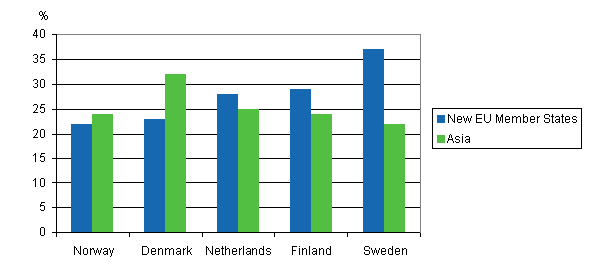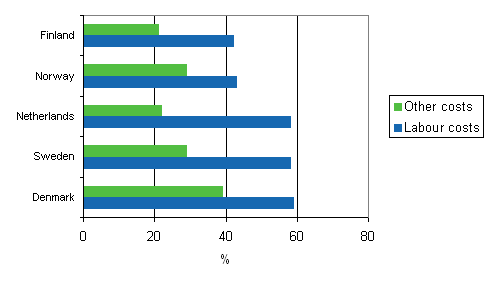Press release 10.6.2008
Finnish enterprises frequently move business functions abroad
A total of 16 per cent of Finnish enterprises have sourced functions internationally during 2001-2006. International sourcing is the most common in Danish enterprises, 19 per cent of which engage in it. Fourteen per cent of enterprises in Norway and the Netherlands have sourced business functions internationally. These data are based on a joint survey by Statistics Finland and other statistical offices which covers enterprises with at least 50 employees in Finland, Denmark, Norway and Sweden and enterprises with at least 100 employees in the Netherlands.
In all these countries manufacturing enterprises have been clearly more active than service enterprises in sourcing business functions internationally. Especially in the manufacturing sector the core function, that is the manufacturing itself, is clearly the most frequently sourced function. Around 70 per cent of the manufacturing enterprises in Denmark, Finland and the Netherlands which have sourced business functions abroad have moved their manufacturing functions.
EU countries and Asia the most frequent destinations of international sourcing
More than one-half of international sourcing takes place between EU countries. Another important destination area is Asia, which receives roughly one-fourth of the relocated functions. Industrial manufacturing has been moved to destinations with lower costs, such as the new EU Member States and Asian countries, especially China.
Service-type support functions, such as IT services, are more frequently sourced to neighbouring areas, especially to the old EU Member States. Enterprises reckon China and the new EU Member States will hold their own as destinations for the international sourcing of core functions also in the next few years.
New EU Member States and Asia as destinations of international sourcing, share of enterprises having sourced business functions abroad

Multinational enterprise groups usually move business functions from one country to another inside the group and clearly more seldom to enterprises outside the group. Particularly the Swedish, Dutch and Finnish enterprises follow this model. By contrast, intra-group relocation of functions and international sourcing of business functions to external enterprises are nearly equally common in Danish enterprises.
Labour costs promote international sourcing
Nearly 60 per cent of enterprises in Denmark, Sweden and the Netherlands reckoned that labour costs were a very important factor in moving business functions abroad. Finnish enterprises regarded labour costs a key reason for the sourcing of functions somewhat less often, that is, 42 per cent of them thought so.
Reduced costs as the reason for sourcing business functions abroad, share of enterprises which reported the factor as very important

It is not always possible for enterprises to make independent decisions concerning the sourcing of business functions abroad; often the decisions are taken in a centralised manner by the group head. This is rather common in all the countries which participated in the survey except Denmark: good 40 per cent of the enterprises reported that the decisions are taken centrally. Finnish enterprises assessed more often than other Nordic enterprises that international sourcing of business functions has made it easier for them to enter new markets.
Jobs are both moved and created
Enterprises not only lose jobs due to international sourcing of business functions but they also create new expert positions requiring high-level know how and competence. Enterprises in all the countries which participated in this survey more frequently plan to move other types of jobs than expert jobs abroad in the next few years. Finnish, Danish and Norwegian enterprises also assess that new expert jobs will be created more frequently than other types of jobs as a result of the sourcing of functions abroad.
According to enterprises' own assessments, international sourcing of business functions has generally increased the competitiveness of the enterprise. In all the countries some 60 per cent of enterprises which had sourced functions internationally assessed that their competitiveness had improved. Competitiveness had been improved especially by reduced labour costs. Especially Dutch and Danish enterprises had been successful at this.
The inquiry on international sourcing is a project partly funded by the EU and carried out in a total of 13 EU countries as well as Norway. The report published now covers the Nordic countries and the Netherlands. International sourcing of business functions refers to the total or partial movement of business functions (core or support business functions) currently performed in-house or domestically outsourced by the resident enterprise to either non-affiliated (external suppliers) or affiliated enterprises located abroad. The survey covers both manufacturing and service sectors and looks at the international sourcing of enterprises' core and support business functions.
Source: International Sourcing, Moving business functions abroad. Statistics Finland in collaboration with the national statistical offices of Denmark, Sweden, Norway and the Netherlands.
Inquiries: Mr Samuli Rikama +358 9 1734 3324
Director in charge: Ms Kaija Hovi
PDF version of the publication on the website of Statistics Denmark
